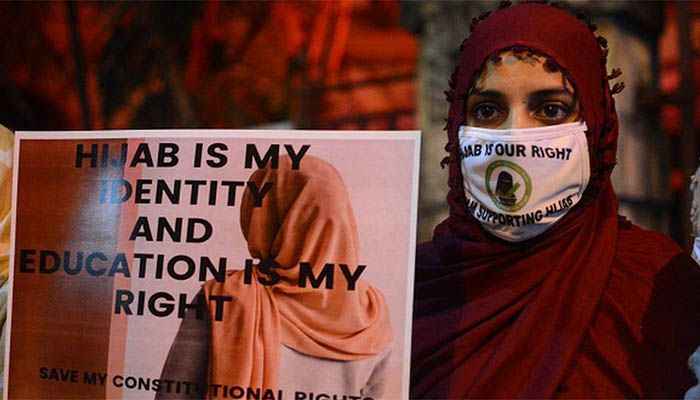
Divya Arya
Publish: 16 Feb 2022, 08:31 pm

The hijab row has sparked protests across India || Photo: Collected
How do you sit in a
classroom with people who shouted slogans against your right to wear a hijab?
That's the question
troubling Saima, whose name has been changed on request. Last week, the
20-year-old was one of several hijab-clad Muslim women who watched anxiously as
hundreds of Hindu students protested against Islamic headscarves. They were
wearing saffron scarves and turbans, and yelling Jai Shri Ram or "victory
to Lord Ram" - the chant and the colour are commonly associated with the
Hindu right-wing.
Saima, the only
Muslim woman in her class, says she saw many of her classmates among the
protesters.
The hijab has become the subject of a fierce debate in India. It all began last month when six teenagers at a government-run college in Karnataka's Udupi district began protesting after they were barred from classes for wearing headscarves.
 It's not unusual to find women students with headscarves in India
It's not unusual to find women students with headscarves in IndiaThe issue quickly
turned divisive with Hindu students turning up in colleges wearing saffron
shawls, and right-wing groups on both sides making provocative statements.
Fearing violence, the state government shut down high schools and colleges.
The question of
whether Muslim girls and women in Karnataka can wear the hijab in school and
college will be decided by the state's high court which is currently hearing
the matter.
As they prepare to
return to classes on Wednesday, young people on both sides of the divide are
struggling to understand their classmates and friends.
"I worry that
this will obviously create an environment of hate in the class," says
Saima.
"We will start thinking that he is a Hindu and that's why he stood against me, and they will think that she is a Muslim and that's why she was against me."
Aakanksha
Hanchinamath, who goes to Saima's college, was one of the saffron-wearing
protesters last week.
The protest was the
result of a "collective decision" by Hindu students, Ms Hanchinamath
said.
"We wanted to show them what will happen if you bring religion into it," she said.
 Aakanksha Hanchinamath participated in protests wearing saffron scarves
Aakanksha Hanchinamath participated in protests wearing saffron scarves
This part of Karnataka has long seen radicalization among student groups - be it the student wing of the Hindu nationalist Bharatiya Janata Party (BJP), which is currently in power in Karnataka, or the Campus Front of India (CFI), the student wing of the radical Islamic group, Popular Front of India.
In this case, the
CFI supported the girls protesting in Udupi - and as the issue snowballed, the
BJP's student wing led marches with students sporting saffron shawls.
"If communal
organisations like the CFI support Muslim students, then why should we and our
girls watch silently?" says Raghupathi Bhat, a BJP lawmaker from Udupi.
This isn't the
first time the hijab has sparked protests in Karnataka's polarised coastal
belt, where Hindu and Muslim right-wing groups have been established for
decades.
But in the past
such issues were quickly resolved, says Prof Phaniraj K, who belongs to a civil
society group that tracks communal incidents in the state.
He points to a
similar protest in Mangalore 15 years ago, where college authorities and
students found a "middle ground" in five days.
"Sporadic
incidents of questioning hijab and skull caps inside educational institutions
have continued but they never blew up like this," he says.
But increasing
polarisation has led to differing rules around the hijab across colleges.
Many private
colleges, like the one Saima attends, allow the hijab in classrooms.
Government-run
colleges revise the rules every year. Decisions over uniforms rest with the
Development Committee headed by a local legislator.
In the Udupi college, where protests first broke out, the man in charge was Mr Bhat, the BJP lawmaker. But talks between him, the protesting girls' parents and college authorities ended in a stalemate.
 The hijab row sparked counter-protests from Hindu students
The hijab row sparked counter-protests from Hindu studentsRashmita Shetty, who studies at a private college in Udupi, says she and her Muslim friends watched in horror as the situation escalated in recent weeks.
Several Muslim students
attend her college, which did not witness any counter-protests by Hindu
students. Yet, she says things have certainly changed.
"We had never
even noticed if a girl wore a hijab or not. Sometimes they would remove it
because it was hot. This was never an issue," she adds.
"My Muslim
friends have told me that this will always remain in their minds, that they
were denied their rights at such a young age and that they will be looked at
differently now."
The situation, she
says, was worsened by provocative comments by political leaders - while one BJP
leader asked Muslim students to go to Pakistan if they wanted to wear a hijab,
another said the hijab had to be opposed in colleges so that Karnataka wouldn't
become a "Taliban state".
Ms Hanchinamath says
she never looked at religion while making friends but is determined not to back
down now.
"I know it
will change things among us, because they think we are opposing them, but we
are only asking for discipline and equality, that everyone should wear the same
uniform," she says.
Ms Shetty, however,
says she will support her Muslim friends as she feels their demand to wear
headscarves is justified.
"It continues
to bother me that I did not raise slogans with Muslim girls. But how do I do it
in this atmosphere? It is such a dilemma," she says.
"I choose to stay silent and support my friends. That is my protest."_BBC
Subscribe Shampratik Deshkal Youtube Channel
Topic : Hijab Controversy Karnataka BJP
© 2024 Shampratik Deshkal All Rights Reserved. Design & Developed By Root Soft Bangladesh